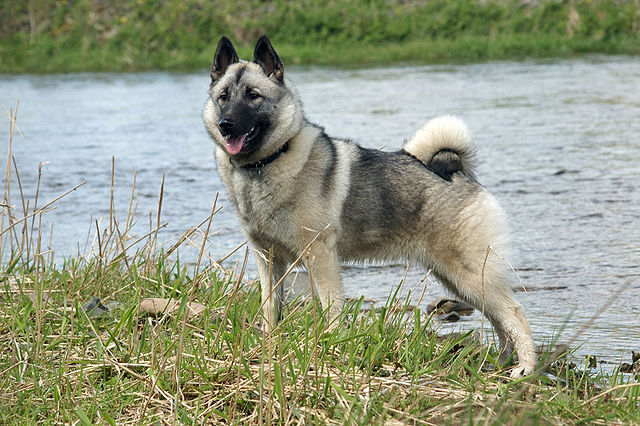The Norwegian Elkhound is the best known of the various Scandinavian spitz breeds and has been called “the dog of the vikings”. He was bred to hunt moose (not elk – despite his name), as well as to serve as family guardians and occasional herders. Devotees of these black-tipped silver dogs say that they make some of the very best companions. Indeed, Elkhounds are the happiest when they are around the people whom they love. Because of their long history working with humans, these dogs have developed into exceptionally loyal and friendly creatures, although their personality quickly becomes independent while they are in “work mode” – such as when hunting.
While Elkhounds have been described as stubborn by some, many are just exceptionally independent and their trainers lack proper motivation tactics. While historically these were working dogs, they were not bred to work with people in the traditional obedience sense. Therefore it follows that a trainer must be able to “get inside the dog’s head” and find a way to communicate with the animal, while providing motivation and “reasons” to do what they are asking the dog to do. Remember also that Elkhounds are highly sensitive and want to listen (usually). These spitz dogs don’t like repetition and will respond by leaving their own spin on things if they begin to get bored.
The Elkhound is extremely gentle when around the very old or the very young. Not only does this make them good candidates for living with children or the elderly, but many have even been successfully trained in service dog work. Their intuitive nature combined with their gentle demeanor and vast intelligence makes them excellent at such jobs. Many have also been utilized as search and rescue dogs (finding injured people in emergencies) thanks to their finely tuned noses. This is a very versatile breed who loves to work and especially enjoys jobs which involve people, whether it be people they know or the constant opportunity to meet new ones!
Elkhounds have high energy, which means that they need to be given both physical as well as mental outlets to keep them calm. Remember that these dogs need a job – it is in their blood! Every Elkhound should be given daily exercise such as a walk or hike, in addition to some other sort of “purpose”. For example, owners of this breed enroll their dogs in agility or nose work classes in order to keep their dogs happy and fulfilled. 
The Norwegian Elkhound is not the breed to own if you spend most of your day at work, nor if you plan on keeping the dog outside all the time (unless you are going to be outside with him frequently). These social butterflies will not develop correctly if kept isolated, and can quickly become depressed. There is nothing that can substitute for this companionship, whether it be providing a second dog, spoiling the dog on the weekends, or guiltily giving the dog extra food “to make up for it” (and Elkhounds are prone to getting fat, anyway). Making sure you have enough time for the dog is one of the most important things you can do – even when they get old (keep in mind the breed is long-lived).
Norwegian Elkhounds are known as barkers and can become nuisance barkers if given no rules. While this trait isn’t for everyone, most people do appreciate the fact that they will bark and put on a big show if an intruder comes near the home, and their stocky build and no-nonsense appearance is enough of a deterrent to keep most prowlers away. While they make great watch dogs, however – it is more rare for an Elkhound to actually attack. While confident and protective, Elkhounds will save harming a person as an absolute last-resort.
Despite having a somewhat-short coat, it is quite thick and does require regular brushing – particularly during heavy shedding season which comes twice a year. This coat protected them while doing their various duties outside in the harsh climates of Norway! While brushing will be a frequent occurrence, however, Elkhounds don’t need baths very often as they tend to have little doggy odor. They also don’t require any trimming whatsoever. While relatively clean, they aren’t suggested for fastidious people simply because of their shedding.
